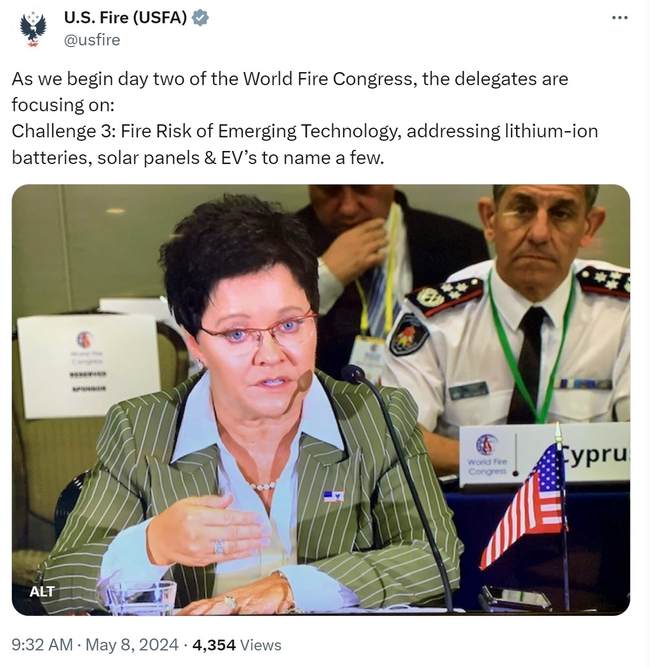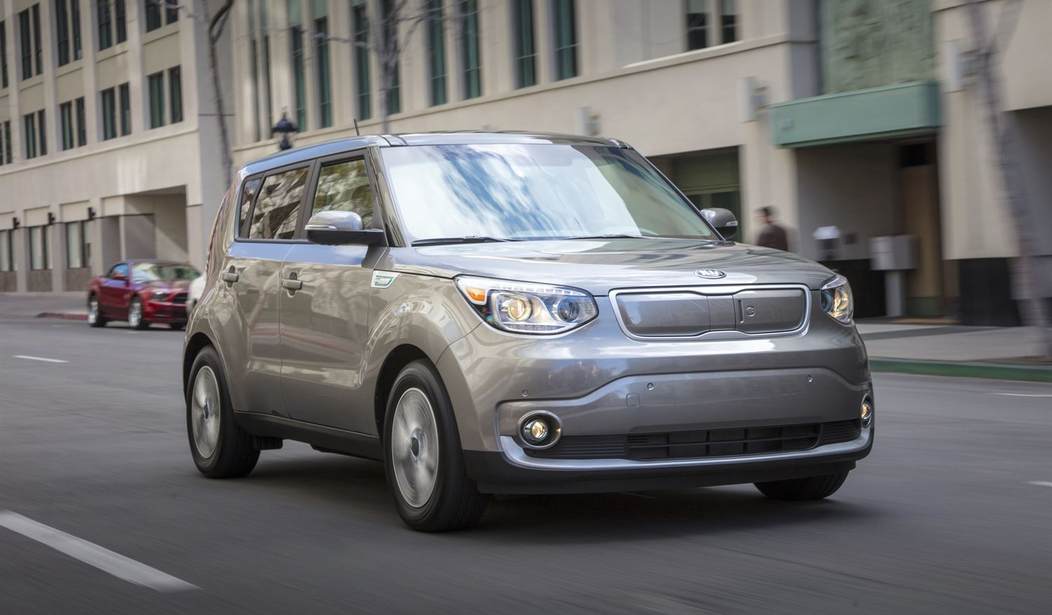This is truly a wild kind of story for a country that, until just a few months ago, was literally trying to jam electric cars down everyone's throats, and still make driving an ICE a pain in the tookus.
Where on earth are you supposed to put your government-mandated electric vehicle...well, I mean, PARK it.
I know where the government can put their mandate, but this sign turns into a trend, and EV owners are going to be Schlitz outta luck.
EV driver turned away from UK hospital parking lot because his car "could explode."https://t.co/cvY8eDPCB3 pic.twitter.com/S35VbnmCKI
— Steve Milloy (@JunkScience) May 8, 2024
The dad was basically told to "put that thing on the lawn."
A father who was taking his child to Alder Hey hospital in Liverpool says he was turned away from the car park because he was driving an electric vehicle (EV).
Paul Freeman-Powell said he was told to park next to nearby grass because his car "could explode."
The hospital says it has temporarily banned access to the car park while it improves its sprinkler system.
Now, industry figures would dispute EVs bursting into flames more often than gas guzzlers, but they also don't get into the weeds about whether that's proportionally factual, as in there are exponentially more ICE vehicles on the road with a bazillion more miles operational time. Be the figures what they may, there's no question that when an EV lights off, it's hotter, brighter, and almost impossible to extinguish, proving to be a real challenge to fire departments everywhere.

The lack of emergency procedures and effective mitigation/containment for EV fires has led to draft regulations in the UK for public parking structures that are running over 100 pages, and warnings about chargers in buildings from the Australians.
EVs and car parks don't mix. Hospital car park in UK prohibits EVs while sprinklers are upgraded 💰💰💰, as NSW Fire and Rescue says EV charging in buildings is "a likely threat to life safety".
— MGUY (@mguytv) May 7, 2024
Watch full video: https://t.co/MCv3JcrzsW#ElectricVehicle #Electriccar pic.twitter.com/Ze4x5ICMEW
It would be one thing if they could knock these down in a hurry, but they can't. Lithium batteries are burning at up to 5000°F within minutes if, God forbid, they light off.
...Battery-powered vehicles account for a small share of car fires, but controlling EV fires is difficult. Typically, an EV fire burns at roughly 5,000 degrees Fahrenheit (2,760 Celsius), while a gasoline-powered vehicle on fire burns at 1,500 F (815 C). It takes about 2,000 gallons of water to extinguish a burning gasoline-powered vehicle; putting out an EV fire can take 10 times more.
This is a major concern in large cities where electric vehicles are popular. Fire departments in New York City and San Francisco report handling more than 660 fires involving lithium-ion batteries since 2019. In New York City, these fires caused 12 deaths and more than 260 injuries from 2021 through early 2023. Clearly, there is a need for safer handling and charging practices, as well as technical improvements to batteries.
...Cellphones and digital cameras can operate on a single battery, but an electric car needs much more energy and power. Depending on its design, an EV may contain dozens to thousands of single batteries, which are known as cells. Cells are clustered together in sets called modules, which in turn are assembled together in packs. A standard EV will contain one large battery pack with many cells inside it.
Those are the batteries in functioning vehicles.
What about scrapped ones?
It seems they have a mounting problem in England with those, and I can't imagine we're far from the same, all things considered.
How's that earth-friendly, recycling, renewable thing going again?
Gosh if it isn't looking like just another climate cult lie..
Electric carmakers are breaking the law by allowing batteries from scrapped vehicles to pile up in scrapyards, a senior industry figure has claimed.
Damaged electric vehicle (EV) batteries pose a fire risk as lithium releases energy rapidly, creating temperatures of up to 400C.
Manufacturers are legally obliged to take back these dangerous batteries from scrapped cars, but giants including BMW, Citroen, Honda and Mercedes-Benz have been accused of failing to collect them from scrapyards.
With Rishi Sunak, the Prime Minister, having ordered that 22 per cent of all new cars sold this year must be EVs, scrapyard operators warn that the growing problem of scrap batteries cannot be ignored.
...“Instead, we’re finding some manufacturers and dealerships are still not prepared or willing to engage.
“In some cases, it can take months or even years to get potentially dangerous batteries collected.
“Hybrids and EVs are now commonplace in our members’ premises, but the risks are still often being ignored. It’s very frustrating.”
...EV batteries are usually guaranteed by carmakers for 100,000 miles or eight years, whichever comes first.
Typical petrol cars last for around 200,000 miles over 14 years.
Batteries in EVs can lose up to 12 per cent of their charge after six years, according to data company Geotab, shaving nearly 30 miles off the typical EV range of 236 miles.
These ongoing safety concerns, both public and "what about parked and charging in my house" are going to have to be addressed. They are yet more serious, big detractors as far as the general public buying EVs willingly of their own volition.
A slowdown in the demand for electric cars has sparked off such a brutal price war that even industry behemoth Tesla Inc. is struggling to cope. But for the newer entrants in the race, it is fast turning out to be a battle for survival.
...In fact, Levington warns, there may be dire consequences — auto bankruptcies may start to pick up.
“A pileup of electric vehicles at US dealers and staggering 32% decline in used EV prices since early 2023 suggests manufacturers that built plans around a rapid growth trajectory now have a more challenging road ahead,” Levington wrote in a note on Wednesday. According to his analysis, Fisker Inc., Lucid, Rivian and Aston Martin Lagonda Global Holdings Plc screen among the riskiest carmakers.
The cracks have already started to spread. Fisker has paused production and said that it may file for bankruptcy, and its Austrian unit began insolvency proceedings this week. Other failures include Ohio-based Lordstown Motors Corp., the UK arm of Arrival SA, and electric-bus maker Proterra Inc.
As for the hospital in the story, they hot-footed a PR person out with a statement that EVs were more than welcome in their main car park. They even helpfully pointed out that they have 14 charging stations available for visitors.
They just weren't willing to take a chance on an EV in a garage that didn't have a functioning sprinkler system.
Your 20-year-old Dodge or Vauxhall ICE was still welcome to park there, though.
Makes about as much sense as the rest of it, doesn't it?
A LATE BEEGE UPDATE: Considering the subject and discussion in the comments, I'll just leave this breaking news here...
NEW: Porsche recalls thousands of Taycans over faulty batterieshttps://t.co/9yfRcRpHVf
— Insider Paper (@TheInsiderPaper) May 9, 2024
Maybe parking on the lawn isn't such a bad idea...
German sports carmaker Porsche on Thursday confirmed it had recalled several thousand of its electric Taycan model because of risks their batteries could catch fire.
Faulty cells in some batteries could short-circuit and ignite, a spokesperson said.
Some 858 Taycans were initially identified as being at risk and recalled in January, but after further checks the company determined that further vehicles could also be affected.
Porsche said 2,936 of the sporty four-door cars showed “anomalies”, which requires changing the modules on the 600-kilogram (1,300-pound) batteries housed under the car.









Join the conversation as a VIP Member